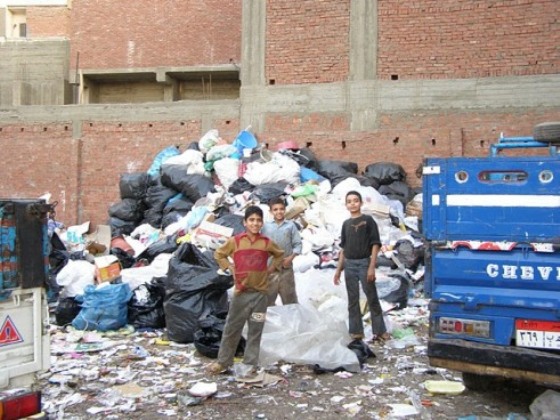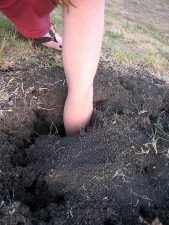Efforts to find solutions to Cairo Egypt’s mounting garbage problems have ranged from allowing hundreds of thousands of pigs to eat the city’s organic wastes’ to using rag pickers to sort through the mountains of garbage that have accumulated.
Cairo is one of the world’s most populated and congested cities and since the beginning of the 2011 Arab Spring protests cleaning up is paramount.
Cleaning up mountains of garbage in a city of nearly eight million people crowded into a metropolitan land area of 453 square kilometres has never been an easy task. One of the ways in which large amounts of organic wastes have been dealt with has been to allow the use of pigs owned by minority Christian populations to consume organic wastes such as rotting fruit and vegetables, leftover foodstuffs and other “materials”.
These pigs are owned by people who are known as “Zabaleen”, which translated literally means “garbage people” and derived from the Arabic work zebala which means garbage.
RELATED: Tetra Pak’s sustainability efforts in Cairo’s recycling business.
This method involving pigs nearly came to an abrupt halt in 2009 when the Egyptian government decided to cull around 300,000 pigs in response to a scare involving the world-wide swine flu virus. Some people say that the virus was just an excuse to rid the predominantly Muslim city of swine.
The Zabaleen have been efficient in sorting out reusable and recyclable items from garbage, resulting in these modern day rag pickers to become known as efficient recyclers. Whole families are often involved in this business, including young children who are taught what to look for in the piles of wastes that are still prevalent on city streets and neighborhoods.
Losing so many pigs at once (the government made the pig culling decision within the span of 24 hours) resulted in a great loss of livelihood for pig owners whose animals were worth a significant amount of money.
“Every family had at least a dozen animals and could get about $1,400 for the sale of a pig. That gave them some emergency money when they needed it. The rag collector’s income fell by half,” said Ezzat Naem, head of the Zabaleen union.
Another union spokesperson added that the slaughter of the pigs ended a very efficient way to rid city streets of rotting organic garbage.
But now the Zabaleen are becoming more recognized as an efficient solution for getting rid of Cairo’s garbage. Members of the Zabaleen union have made agreements with city waste disposal companies to work together with them to help clean up the immense piles of garbage. The pigs are also making a quiet comeback, as their role to ridding the city from its waste problems is becoming more appreciated.
The Zabaleen’s role in ridding Cairo of its garbage can be summed up in a comment made by Zabaleen union head Ezzat Naem, a 50 something year old Zabaleen garbage collector who has been involved in this work for nearly his entire life: “We are the ones who have always been treated as a backward people; yet we have devised a more ecological model for ridding Cairo of its garbage.”
As such, there now appears to be more appreciation for pigs and rag pickers in Egypt’s largest city. At least by this Green Prophet.
More article about Cairo’s garbage and pigs issues:
Cairo’s Waste-Eating Pigs Make a Quiet Comeback
Zabaleen Film Portrays Cairo’s Garbage City People
Egypt Culls 300,000 Pigs in Response to Swine Flu Virus
Photo of young Zabaleen trash collectors: wikipedia





One thought on “Cairo Sustainably Manages Garbage with Unionized Pigs and Ragpickers”
Comments are closed.